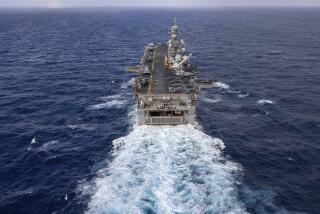Democrats Fail to Persuade Reagan to Drop Gulf Escort : Not One at Meeting Backs Plan
- Share via
WASHINGTON — President Reagan, unswayed by objections from Congress, served notice today that the United States will proceed with putting Kuwaiti oil tankers under the protection of American warships in the war-torn Persian Gulf by mid-July.
The White House announced Reagan’s decision after he met with Democratic and Republican congressional leaders in the Cabinet Room for more than an hour, listening to fears that his plan would draw the United States into the war between Iran and Iraq.
Presidential spokesman Marlin Fitzwater said the lawmakers raised “concerns about timing and tactics” of the planned escorts after 11 tankers are placed under U.S. flags and captains. He acknowledged that not a single member of Congress spoke up at the meeting in support of Reagan’s idea.
Won’t Undercut Reagan
Later, talking with reporters in the White House driveway, Democratic leaders conceded they failed to persuade Reagan to delay the convoy operation. However, they indicated Congress would not try to derail the plan with legislation prohibiting escort duty.
“To pull the rug out from under that commitment could be dangerous,” said House Speaker Jim Wright (D-Tex.). Yet, he said Democrats told Reagan they were worried about the possibility that in escorting Kuwaiti ships, the United States could “inadvertently slip and slide our way into being an active participant in the Iran-Iraq War.”
Senate Majority Leader Robert C. Byrd (D-W.Va.) said, “We came to express our hope that the Administration would delay . . . until we can all think this thing through together.”
No Time for Rejection
Acknowledging that Reagan was unmoved by their pleas, Byrd said, “We don’t want to take action to stop this reflagging because we can’t do that in a timely fashion. They plan to go forward.”
On Capitol Hill, the Senate Foreign Relations Committee voted 11 to 8 in favor of legislation to halt the reflagging and escort operation. But Sen. Jesse Helms (R-N.C.) said he would “do all I can” to prevent the bill from being considered, and Byrd said he would oppose the legislation.
Sen. Alan Cranston (D-Calif.) said “we will just have to now wait and see what develops when those ships are flagged.” He said the Administration “is simply going it alone to protect oil that we do not use and to protect allies who refuse to help. We’re heading for another Beirut.”
Policy Doesn’t Hold Up
Sen. Sam Nunn (D-Ga.), a specialist on defense issues, said, “On this point, I clearly disagree with (Administration officials). I do not think they’ve thought through the strategic implications. . . . I don’t think the policy holds up to any kind of scrutiny.”
While the congressional leaders talked with reporters outside, top Administration officials held a briefing inside to underscore Reagan’s determination to proceed with the escorts--which already have been delayed for weeks.
The officials acknowledged there is an increased risk of attacks on both the Kuwaiti vessels and their American escorts.
“I didn’t say they wouldn’t be attacked,” said Adm. William Crowe, chairman of the Joint Chiefs of Staff.
“You asked me if we could protect them,” he said to one reporter. “Yes, we can.”
Defense Secretary Caspar W. Weinberger said, “It is not a risk-free operation and it has not been presented as such. But the risks of not doing it, I think, are a lot higher.”
Conceding that Congress is unhappy with the plan, Weinberger said, “There’s opposition to almost everything we want to do.”
CIA Director William H. Webster reluctantly conceded that the reflagging operation probably would create “an increase in the threat” of terrorism. He said the CIA has been analyzing possible Iranian reaction.
More to Read
Get the L.A. Times Politics newsletter
Deeply reported insights into legislation, politics and policy from Sacramento, Washington and beyond. In your inbox three times per week.
You may occasionally receive promotional content from the Los Angeles Times.










